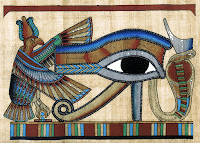The White Virgin of Alchemy
>> Saturday, January 24, 2009
Once alchemists overcame the issue of dissolving gold, they eliminated troublesome compounds of nitrogen with antimony. The ancients derived antimony from a variety of sources, which they called Prima Materia. Two popular starting points for the Egyptians were the minerals of lead oxide called galena, and tin dioxide called cassiterite.
Antimony was purified with iron or Mars, just as in the modern industrial process of extracting antimony from stibnite ore. When they saw the pure white vapor of antimony rise, the alchemists likened it to a white virgin queen, the moon goddess, and called it the Philosophers' Mercury. This mercury should not be confused with metallic mercury, which is always poisonous if used alchemically.
The white virgin indeed brought relief to the injured. A fragrant cream made from a precipitate of antimony became a universal unguent of the alchemist doctors. Crusaders used this salve or universal medicine to heal wounds and it has been used right up until very recent times. The secret ole of antimony was so intriguing that the metal, although very soft and less bright than silver, was often used for tableware such as salt salvers and gravy boats. Adepts could display these openly in public, with few knowing the real meaning of the white virgin in the metal.
Finally, mercury, white virgin of alchemy, was married to the Sun King. A rainbow of colors appeared in the alchemist's flask. A green dragon battles a Red Man. The blood of the green dragon is the necessary sign that the son of love will be born. Finally, in the faeces of the reaction, a rock appears. It is the green lion tinged with lilac. This royal color signifies Horus rebirth as king.
Research: wrong use of mercury, Crusaders' followers in ME
Add: Egyptian mythology
Source: Stuart Nettleton, The Alchemy Key The Mystical Provenance of the Philosophers' Stone, 2002, pp. 12-13
Antimony was purified with iron or Mars, just as in the modern industrial process of extracting antimony from stibnite ore. When they saw the pure white vapor of antimony rise, the alchemists likened it to a white virgin queen, the moon goddess, and called it the Philosophers' Mercury. This mercury should not be confused with metallic mercury, which is always poisonous if used alchemically.
The white virgin indeed brought relief to the injured. A fragrant cream made from a precipitate of antimony became a universal unguent of the alchemist doctors. Crusaders used this salve or universal medicine to heal wounds and it has been used right up until very recent times. The secret ole of antimony was so intriguing that the metal, although very soft and less bright than silver, was often used for tableware such as salt salvers and gravy boats. Adepts could display these openly in public, with few knowing the real meaning of the white virgin in the metal.
Finally, mercury, white virgin of alchemy, was married to the Sun King. A rainbow of colors appeared in the alchemist's flask. A green dragon battles a Red Man. The blood of the green dragon is the necessary sign that the son of love will be born. Finally, in the faeces of the reaction, a rock appears. It is the green lion tinged with lilac. This royal color signifies Horus rebirth as king.
Research: wrong use of mercury, Crusaders' followers in ME
Add: Egyptian mythology
Source: Stuart Nettleton, The Alchemy Key The Mystical Provenance of the Philosophers' Stone, 2002, pp. 12-13
Technorati Tags:



0 comments:
Post a Comment